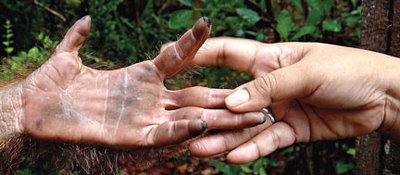 Specifically, she imagined an experiment in which a bonobo child would be raised by humans and given all the advantages and social considerations that are given to human children (including and especially exposure to verbal language starting from a very early age). A bonobo raised in this way, argued Savage-Rumbaugh, would be 'uplifted' to a significant degree relative to their default state-of-nature being.
Specifically, she imagined an experiment in which a bonobo child would be raised by humans and given all the advantages and social considerations that are given to human children (including and especially exposure to verbal language starting from a very early age). A bonobo raised in this way, argued Savage-Rumbaugh, would be 'uplifted' to a significant degree relative to their default state-of-nature being.Quite obviously she has a point. Imagine a counter-experiment (which will have to remain a thought experiment for obvious ethical reasons) in which a human child is raised in the wild in the same way a great ape would be today. Tarzan notwithstanding, a Homo sapien stripped of all civilizational accoutrements would more closely resemble a wild bonobo than a socialized human.
That being said, there are definite limits to the cognitive and language capacities of the great apes no matter the degree to which they are integrated into 'human' society and educated. In this sense, if we are to consider and treat them as persons, and should we refuse to help them with meaningful biological augumentation, these primates would live in perpetuity as severely disabled persons relative to both humans and their full potential as uplifted agents.
Dr. Savage-Rumbaugh's thought experiment sparked a discussion between myself and Dr. J. Here's an excerpt taken from an email I received from him:
A final thought on the experiment of raising a bonobo as a human being: similar arguments can and were used to argue that it would be unethical to adopt a child from another race, or to bear a child with a disability. But we don't take those arguments as prohibitive of parents' rights to adopt or bear disabled kids. Instead we focus on the obligation to the child to be raised with the fullest help in facilitating their full flourishing.Like Savage-Rumbaugh and Hughes, I also support the idea of environmental and cultural uplift for the great apes, particularly for those already in confinement. Dr. Hughes in particular brings up some fascinating considerations that would be part of the uplift process.
In other words, although we generally don't stop people with cognitive deficits from having children, if we find a child being raised by mute and profoundly retarded parents they can be taken into protective custody and adopted by parents who can teach them to speak and so on. Taking a trans-ape ethics seriously might then obligate us to do the experiment you propose, with all the complexity of remaining sensitive to not causing the bonobo existential angst, loneliness and loss of connection with their racial/ethnic roots. (A good thing that our reproductive and adoptive decisions aren't subject to "human subjects" IRB reviews!)
I suspect that as we have more non-surgical means for cognitive enhancement of apes, such as gene therapies and pharmaceuticals, the ethical debate over the 'uplift' of apes will heat up.
Yet, with all that said, such a project would forever remain a work in progress without real biological augumentations. As I noted to J in a follow up email, "Without significant improvements to their cognition and language skills, they would forever remain as hopeless dependents, with the line distinguishing them as dependent or pet remaining hazy at best."

No comments:
Post a Comment